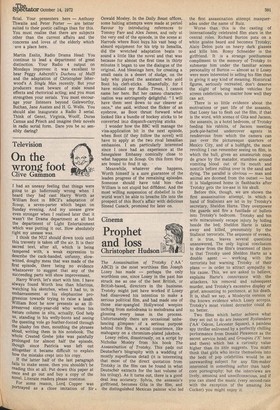Cinema
Prophet and loss
Christopher Hudson
The Assassination of Trotsky (' AA ' ABC2) is the most worthless film Joseph Losey has made — perhaps the only worthless one, since Losey in the past has struck me as one of the best British, or British-based, directors in the business. Trotsky might just have worked if Losey had disavowed his intention to make a serious political film, and had made one of those star-spangled Hollywood weepies inching from melodrama to melodrama and glossing every issue in the process. Unfortunately there are occasional unbalancing glimpses, of a serious purpose behind this film, a social conscience, like mahogany on a chromium-plated jukebox.
Losey relies, disastrously, on a script by Nicholas Mosley from his book The Assassination of Trotsky. This pads out Deutscher's biography with a wadding of mostly superfluous detail (it is interesting that most of the direct quotation from Trotsky in the film can be found in what Deutsche extracts for the last volume of his trilogy). As it turns out, there is a good deal less accuracy. Sylvia, the assassin's girlfriend, becomes Gita in the film, and the distinguished Mexican painter w'no led the first assassination attempt masquerades under the name of Ruiz.
Worse than this is the casting of internationally celebrated film stars in the central roles. Richard Burton puts on a white goatee beard and becomes Trotsky; Alain Delon puts on heavy dark glasses and kills him. Romy Schneider is the girlfriend. It is a strange posthumous compliment to the memory of Trotsky to submerge him under the familiar screen personality of Burton — almost as if Losey were more interested in selling his film than in giving it any kind of meaning. Historical figures, seriously recreated, don't deserve the slight of being made vehicles for screen celebrities, no matter how well they can act.
There is so little evidence about the motivations or past life of the assassin, that Losey has to flesh out the film, if that is the word, with scenes of Gita and Jacson, the assassin, in a hotel bedroom, of Trotsky feeding his rabbits, of Jacson meeting pork-pie-hatted undercover agents in rendezvous from which the camera can pan over the picturesque quarters of Mexico City, and of a bullfight, the most revolting I can remember seeing on film, in which the bull, given an amateurish coup de grace by the matador, stumbles around vomiting blood out of its mouth and nostrils before rolling over in the sand and dying. The parallel is obvious — man and animal are doomed from the outset — but it is bludgeoned home in flashbacks after Trotsky gets the ice-axe in his skull.
Before this, though, we are shown the first assassination attempt, in which a band of Stalinists are let in by Trotsky's secretary, Sheldon Harte. They overpower the guards and fire a fusillade of bullets into Trotsky's bedroom. Trotsky and his wife miraculously escape injury by hiding beside the bed; Sheldon Harte is taken away and killed, presumably by the Stalinist terrorists. The sequence of events, it is true, leaves several questions unanswered. The only logical conclusion to draw from the film's treatment of them is that Trotsky used Sheldon Harte as a double agent — working with the terrorists but warning Trotsky of their plans — in order to attract sympathy to his cause. This, we are asked to believe, explains Harte's connivance with the attackers, his removal and subsequent murder, and Trotsky's excessive display of grief, amounting to penitence, at his death. It is, shall we say, a Mosleyite version of the known evidence which Losey accepts. Trotsky's most violent detractor could do no better.
Two films which better achieve what they set out to do are Innocent Bystanders ('AA' Odeon, Leicester Square), a painless spy thriller enlivened by a perfectly chilling performance from Donald Pleasence as the secret service head; and Groupies ('X' here and there) which has a curiosity value higher than its title suggests. You might think that girls who invite themselves into the beds of pop celebrities would be an unrewarding subject for any film-maker interested in something softer than hardcore pornography: but the interviews are lively, amusing and unselfconscious, and if you can stand the music (very second-rate with the exception of the amazing Joe Cocker) you might enjoy it.














































 Previous page
Previous page